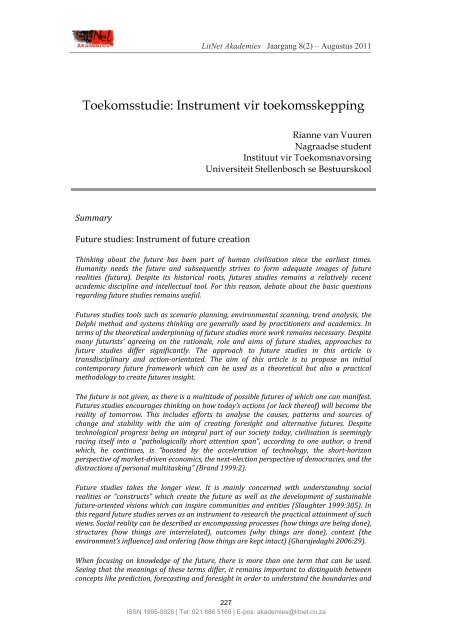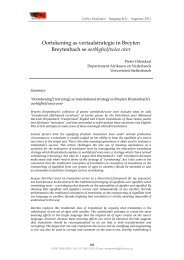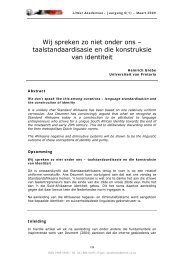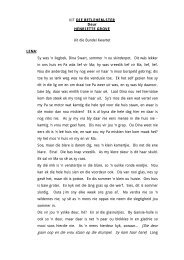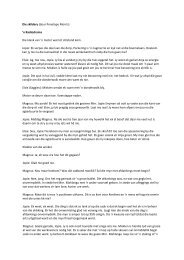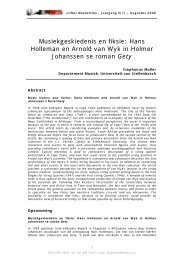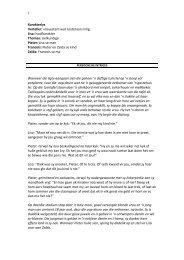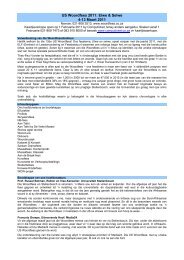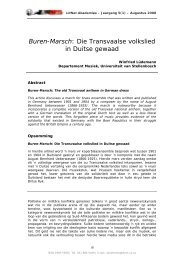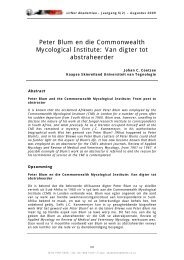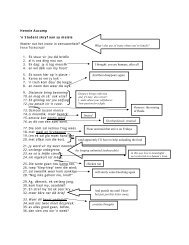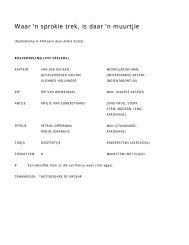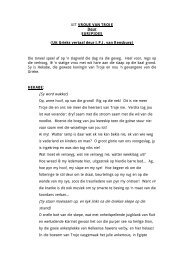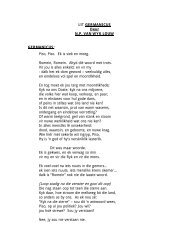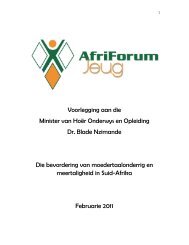Jaargang 8, nommer 2 – Augustus 2011 - LitNet
Jaargang 8, nommer 2 – Augustus 2011 - LitNet
Jaargang 8, nommer 2 – Augustus 2011 - LitNet
You also want an ePaper? Increase the reach of your titles
YUMPU automatically turns print PDFs into web optimized ePapers that Google loves.
<strong>LitNet</strong> Akademies <strong>Jaargang</strong> 8(2) <strong>–</strong> <strong>Augustus</strong> <strong>2011</strong><br />
Toekomsstudie: Instrument vir toekomsskepping<br />
Summary<br />
Future studies: Instrument of future creation<br />
Rianne van Vuuren<br />
Nagraadse student<br />
Instituut vir Toekomsnavorsing<br />
Universiteit Stellenbosch se Bestuurskool<br />
Thinking about the future has been part of human civilisation since the earliest times.<br />
Humanity needs the future and subsequently strives to form adequate images of future<br />
realities (futura). Despite its historical roots, futures studies remains a relatively recent<br />
academic discipline and intellectual tool. For this reason, debate about the basic questions<br />
regarding future studies remains useful.<br />
Futures studies tools such as scenario planning, environmental scanning, trend analysis, the<br />
Delphi method and systems thinking are generally used by practitioners and academics. In<br />
terms of the theoretical underpinning of future studies more work remains necessary. Despite<br />
many futurists’ agreeing on the rationale, role and aims of future studies, approaches to<br />
future studies differ significantly. The approach to future studies in this article is<br />
transdisciplinary and actionorientated. The aim of this article is to propose an initial<br />
contemporary future framework which can be used as a theoretical but also a practical<br />
methodology to create futures insight.<br />
The future is not given, as there is a multitude of possible futures of which one can manifest.<br />
Futures studies encourages thinking on how today’s actions (or lack thereof) will become the<br />
reality of tomorrow. This includes efforts to analyse the causes, patterns and sources of<br />
change and stability with the aim of creating foresight and alternative futures. Despite<br />
technological progress being an integral part of our society today, civilisation is seemingly<br />
racing itself into a “pathologically short attention span”, according to one author, a trend<br />
which, he continues, is “boosted by the acceleration of technology, the shorthorizon<br />
perspective of marketdriven economics, the nextelection perspective of democracies, and the<br />
distractions of personal multitasking” (Brand 1999:2).<br />
Future studies takes the longer view. It is mainly concerned with understanding social<br />
realities or “constructs” which create the future as well as the development of sustainable<br />
futureoriented visions which can inspire communities and entities (Slaughter 1999:305). In<br />
this regard future studies serves as an instrument to research the practical attainment of such<br />
views. Social reality can be described as encompassing processes (how things are being done),<br />
structures (how things are interrelated), outcomes (why things are done), context (the<br />
environment’s influence) and ordering (how things are kept intact) (Gharajedaghi 2006:29).<br />
When focusing on knowledge of the future, there is more than one term that can be used.<br />
Seeing that the meanings of these terms differ, it remains important to distinguish between<br />
concepts like prediction, forecasting and foresight in order to understand the boundaries and<br />
227<br />
ISSN 1995-5928 | Tel: 021 886 5169 | E-pos: akademies@litnet.co.za


